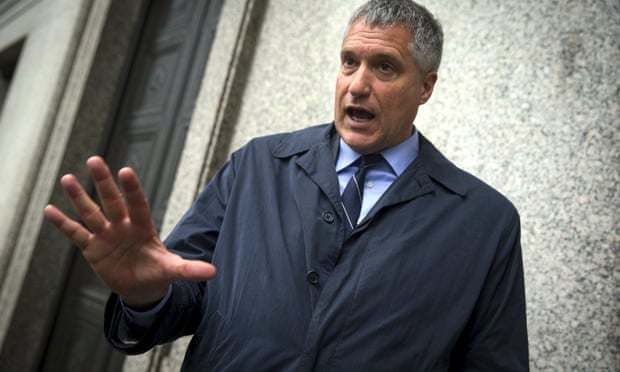Nobel laureates condemn ‘judicial harassment’ of environmental lawyer
Chevron’s treatment of Steven Donziger branded ‘an exceptionally bad case of intimidation’
Twenty-nine Nobel laureates have condemned alleged “judicial harassment” by Chevron and urged the release of a US environmental lawyer who was put under house arrest for pursuing oil-spill compensation claims on behalf of indigenous tribes in the Amazon.
The open letter signed by scientists, authors, environmentalists and human rights activists said the treatment of lawyer Steven Donziger, whose movements have been restricted for more than 250 days, was one of the world’s most egregious cases of judicial harassment and defamation.
Donziger represents 30,000 indigenous people and small farmers who won a $9.5bn class action lawsuit against Chevron in Ecuadorean courts in 2013, as compensation for the contamination of their land by oil extraction activities
In the Chevron court case, ordinary Ecuadorians’ voices don’t seem to count
This judgment was one of the largest ever against an oil company, but not a cent of these damages has been paid to the plaintiffs. Chevron does not have assets in Ecuador and has successfully argued in US courts that the initial ruling was flawed. In other countries, courts have ruled that Ecuador does not have jurisdiction to claim damages.
Donziger, who has been involved with the case for 27 years, has pressed for justice and payment of damages to his clients at increasing personal cost. Some of his legal fees have been covered by high-profile supporters such as Pink Floyd founder Roger Waters, but his reputation, legal credentials and liberty have come under attack.
Chevron has lobbied for his removal from bar associations and launched a countersuit accusing him of bribery and fraud, which was upheld by district judge Lewis A Kaplan in 2014. It was later reported that Chevron paid more than a million dollars for one of the key witnesses in the case – an Ecuadorean judge – to come to the United States. That witness later said he lied under oath.
In an extraordinary legal move, Kaplan then appointed private attorneys to prosecute Donziger for refusing to turn over his electronic devices after the US attorney’s office declined to pursue the case. It has recently been reported that the private law firm Kaplan employed, Seward & Kissel, has had Chevron as a client as recently as 2018.
That case – also heard by Kaplan without a jury – led to Donziger’s house arrest in New York with an ankle bracelet to monitor his movement.
Chevron granted access to environmental activists’ email accounts
Read more
Veteran human rights campaigners have described Chevron’s actions as an exceptionally bad case of intimidation even for a country where wealthy companies increasingly use so-called Slapp (strategic lawsuits against public participation) tactics to delay, distract and run down critics. Environmental campaigners fear this case could be used to deter other challenges.
“[Chevron] want to use all of the PR firms, all of the billions of dollars they have spent on harassing Steven Donziger and his family, to show environmentalists, to show activists all over the world that you cannot go up against corporations, you cannot defend what you believe to be true and right,” said 1997 Nobel peace prize winner Jody Williams. “Those of us who have signed this statement do not accept that.”
Other signatories include laureates for physics, medicine, economics and literature, such as South African author JM Coetzee, as well as actor Alec Baldwin and heads of several international environmental groups.
Advertisement
“At every turn, the indigenous peoples of the Ecuadorean Amazon have been denied access to justice. And when they finally beat an international oil company in court, that company has spared no expense to ignore that ruling, cast itself as the victim, and attack the very people they poisoned and those who stand with them, like Steven Donziger,” said Paul Paz y Miño, associate director of Amazon Watch.
In a statement, Chevron said the original Ecuadorean judgment was fraudulent and there was no merit to the allegations of environmental harm. It said the international tribunal in the Hague and courts in several other countries have ruled that the Ecuadorean verdict cannot be enforced elsewhere.
The company also noted that a US court “has ordered Steven Donziger to stand trial for criminal contempt for repeatedly refusing to comply with court orders. He is currently under house arrest subject to electronic monitoring while awaiting trial. Donziger’s licence to practise law has been suspended in New York and Washington, DC for a pattern of racketeering activity in connection with the case”.
We’ve got an announcement…
… on our progress as an organisation. In service of the escalating climate emergency, we have made an important decision – to renounce fossil fuel advertising, becoming the first major global news organisation to institute an outright ban on taking money from companies that extract fossil fuels.
In October we outlined our pledge: that the Guardian will give global heating, wildlife extinction and pollution the urgent attention and prominence they demand. This resonated with so many readers around the world. We promise to update you on the steps we take to hold ourselves accountable at this defining point in our lifetimes. With climate misinformation rife, and never more dangerous than now, the Guardian’s accurate, authoritative reporting is vital – and we will not stay quiet.
You’ve read 8 articles in the last six months. We chose a different approach: to keep Guardian journalism open for all. We don’t have a paywall because we believe everyone deserves access to factual information, regardless of where they live or what they can afford to pay.
Our editorial independence means we are free to investigate and challenge inaction by those in power. We will inform our readers about threats to the environment based on scientific facts, not driven by commercial or political interests. And we have made several important changes to our style guide to ensure the language we use accurately reflects the environmental emergency.
The Guardian believes that the problems we face on the climate crisis are systemic and that fundamental societal change is needed. We will keep reporting on the efforts of individuals and communities around the world who are fearlessly taking a stand for future generations and the preservation of human life on earth. We want their stories to inspire hope.
We hope you will consider supporting us today. We need your support to keep delivering quality journalism that’s open and independent. Every reader contribution, however big or small, is so valuable.




 Creators of mankind
Creators of mankind Description of “Tall white aliens”
Description of “Tall white aliens” Where they came from?
Where they came from? About hostile civilizations
About hostile civilizations The war for the Earth
The war for the Earth “Tall white aliens” about eternal life
“Tall white aliens” about eternal life Video: “Nordic aliens”
Video: “Nordic aliens” Aliens
Aliens Alien encounters
Alien encounters The aliens base
The aliens base UFO
UFO Technology UFO
Technology UFO Underground civilization
Underground civilization Ancient alien artifacts
Ancient alien artifacts Military and UFO
Military and UFO Mysteries and hypotheses
Mysteries and hypotheses Scientific facts
Scientific facts


















